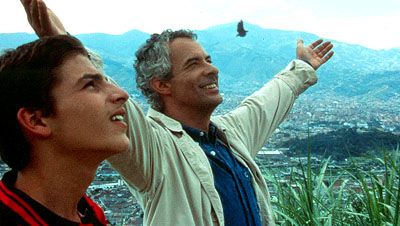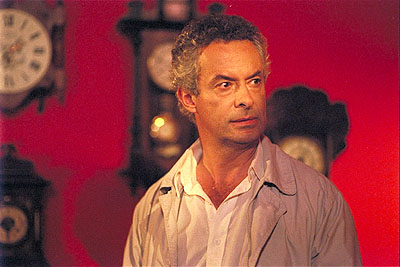Our Lady of the Assassins
(La Virgen de los Sicarios)


Our Lady of the Assassins is less a movie and more a diatribe against any number of things, particularly Catholicism. At certain points, it has some mildly interesting things to say, but the tone is so whiny and incessant that any insightful observations lose out to constant railing against anything and everything. This is director Barbet Schroeder's first foreign language film in over a decade, and it is based on the book of the same name, adapted by the author, Fernando Vallejo. The book recounts the return of an author, also named Fernando (German Jamarillo) to Medellin, Columbia, after a thirty year absence. In that time, the Medellin he remembered disappeared, replaced by slums, gangs, and violence.
Upon his return, he meets and begins an affair with Alexis (Anderson Ballesteros), a young boy and gang member. The two represent the two views of Medellin and Columbia, yesterday and today. Alexis is a gang member who kills on a whim. It's a strange pairing, yet the two wander around during the day talking. Well, Fernando talks and Alexis listens. There is little story to this movie, it is merely endless meaningless philosophizing. Worse, the Fernando character is preachy so the movie feels like a lecture directed at the audience. He talks about the good ol' days and how everything stinks now, and rages against whatever strikes his fancy. The random violence horrifies Fernando, and Schroeder probably wants it to horrify the viewer. Still, Fernando stays with Alexis, and Alexis stays with Fernando. The Alexis character feels flat, and speaks little. It seems that the main reason he stays with Fernando is that Fernando buys him things.
Schroeder (Desperate Measures, Before and After) strove for realism when filming the movie. Most of the people acting in the movie are not actors. Unfortunately, they do not have a natural talent for film. Ballesteros in particular looks bored the entire time. Schroeder filmed on the streets of Medellin, undercover and in the presence of danger similar to that in Our Lady of the Assassins. This is successful in giving a sense of immediacy to the film. The camera is like somebody's line of sight, moving quickly to wherever the action is and ducking when shots fire. The immediacy never quite makes up for the lack of story, but it does set a violent tone for the movie, which Vallejo's script continues. Alexis and Fernando are truly different people, and it's amazing that Fernando stays with Alexis given all the violence. Later in the movie, Fernando meets Wilmar (Juan David Restrepo). There is a connection between Wilmar and Alexis, but once Schroeder reveals it, one wishes he hadn't because it is pretty lame.